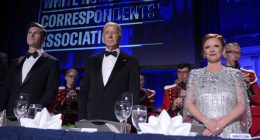
Getting vaccinated against Covid-19 is “an act of love,” Pope Francis says in a public service ad that will start circulating online and on television on Wednesday.
Working with the Ad Council, a nonprofit group, in its first campaign to extend beyond the United States, the pope encourages people around the world to get inoculated.
The ad shows the pope, speaking in Spanish with English subtitles, with church officials from the United States, Mexico, Brazil and other countries describing vaccination as a moral responsibility.
“Thanks to God’s grace and to the work of many, we now have vaccines to protect us from Covid-19,” the pope says in the ad. “They bring hope to end the pandemic, but only if they are available to all and if we collaborate with one another.”
“Getting the vaccines that are authorized by the respective authorities is an act of love. And helping the majority of people to do so is an act of love,” Francis continues. “Getting vaccinated is a simple yet profound way to care for one another, especially the most vulnerable.”
By taking part in the vaccination campaign, the pope has joined a group of influencers that has included former presidents, Kareem Abdul-Jabbar and Elmo from “Sesame Street.” The plea has become increasingly urgent as the mutating virus cycles through unvaccinated populations, threatening global attempts to return to normalcy.
In centers of faith, efforts to counter vaccine hesitancy have often been fraught. Vaccine acceptance among Hispanic Catholics in the United States rose to 80 percent in June from 56 percent in March, while jumping to 79 percent from 68 percent among white Catholics, according to a June survey of more than 5,000 adults by the Public Religion Research Institute and Interfaith Youth Core nonprofit groups. By comparison, 56 percent of Hispanic Protestants and white evangelical Protestants feel the same, a far smaller percentage than other groups.
Many religious Americans who are hesitant told researchers that faith-based arguments could persuade them to get the shot.
“If you’re used to your pastor being a cultural critic or a social commentator, then whether he’s talking about the election or a social movement or the vaccine, you’re more likely to listen to him,” said Heidi A. Campbell, a professor at Texas A&M University who studies media and religion. “You’re going to give whatever he says more street cred, because it comes with an air of divine authority, which he wouldn’t have if he was just a teacher or a news commentator.”
Pastors in Black communities, where congregants skeptical of the Covid-19 vaccines cite a history of medical mistreatment, have publicly rolled up their sleeves to get inoculated. Orthodox Jewish rabbis have taken to YouTube and Zoom to endorse the shot. During the Ramadan holy month, national Muslim groups issued statements emphasizing that the vaccine was halal, or permissible to use.
Still, some religious leaders have met resistance online and on the air, where a large audience can be exposed to vaccine misinformation. On WhatsApp, recordings of rabbis making unproven claims about the vaccines’ effects on fertility have circulated among Orthodox Jewish communities. On Instagram, TikTok and YouTube, some churches and Christian influencers have spread conspiracy theories linking vaccines to microchips or blaming those who get a shot for not trusting God’s will.
Global Vision Bible Church in Mount Juliet, Tenn., recently declared itself a “mask-free church campus” whose congregants “celebrate faith over fear.” Its Facebook page, with 60,000 followers, includes videos featuring crowded gatherings where Greg Locke, the pastor, speaks of “this Delta variant nonsense” and declares the vaccine a “forcible communistic jab in the arm.”
Understand the State of Vaccine and Mask Mandates in the U.S.
-
- Mask rules. The Centers for Disease Control and Prevention in July recommended that all Americans, regardless of vaccination status, wear masks in indoor public places within areas experiencing outbreaks, a reversal of the guidance it offered in May. See where the C.D.C. guidance would apply, and where states have instituted their own mask policies. The battle over masks has become contentious in some states, with some local leaders defying state bans.
- Vaccine rules . . . and businesses. Private companies are increasingly mandating coronavirus vaccines for employees, with varying approaches. Such mandates are legally allowed and have been upheld in court challenges.
- College and universities. More than 400 colleges and universities are requiring students to be vaccinated against Covid-19. Almost all are in states that voted for President Biden.
- Schools. On Aug. 11, California announced that it would require teachers and staff of both public and private schools to be vaccinated or face regular testing, the first state in the nation to do so. A survey released in August found that many American parents of school-age children are opposed to mandated vaccines for students, but were more supportive of mask mandates for students, teachers and staff members who do not have their shots.
- Hospitals and medical centers. Many hospitals and major health systems are requiring employees to get a Covid-19 vaccine, citing rising caseloads fueled by the Delta variant and stubbornly low vaccination rates in their communities, even within their work force.
- New York. On Aug. 3, Mayor Bill de Blasio of New York announced that proof of vaccination would be required of workers and customers for indoor dining, gyms, performances and other indoor situations, becoming the first U.S. city to require vaccines for a broad range of activities. City hospital workers must also get a vaccine or be subjected to weekly testing. Similar rules are in place for New York State employees.
- At the federal level. The Pentagon announced that it would seek to make coronavirus vaccinations mandatory for the country’s 1.3 million active-duty troops “no later” than the middle of September. President Biden announced that all civilian federal employees would have to be vaccinated against the coronavirus or submit to regular testing, social distancing, mask requirements and restrictions on most travel.
Pope Francis, who earlier in the pandemic was criticized for not wearing a mask in public, was vaccinated this year and has already publicly stated that vaccination was morally acceptable and an ethical obligation. In the Vatican, a hall designated for papal gatherings was repurposed as a vaccination clinic.
Joining the Ad Council campaign allows the pope’s message to reach an even wider audience. The Ad Council said it would run the ad on Telemundo, Universo and WarnerMedia platforms, as well as on media in Spanish-speaking countries.
“We’ve said all along that the messenger can be as or more important than the actual message itself,” said Lisa Sherman, the chief executive of the Ad Council, a group that led a similar crusade in the 1950s, when it urged Americans to get vaccinated against polio.
The Ad Council has assembled a diverse group of more than 1,100 representatives for its $60 million vaccination campaign. Earlier this summer, around the same time the organization was completing plans with the pope, it was also signing up the pop rock band Foreigner.
Source: | This article originally belongs to Nytimes.com









